Agentic AI, AI Agents and Its Potential for Hong Kong
As artificial intelligence continues to evolve at a rapid pace, businesses and organizations are increasingly looking for ways to leverage these technologies to drive innovation and efficiency. Among the emerging paradigms in AI, agentic AI stands out as a powerful approach that goes beyond simple content generation. At ThinkCol, Hong Kong's leading AI consultancy, we're at the forefront of implementing these advanced AI systems for businesses across various sectors. This aims to clarify the distinctions between different AI approaches, explain how agentic AI is implemented, explore its use cases, discuss ThinkCol's implementations in Hong Kong, address potential drawbacks, and examine the relationship between MCP and agentic AI.
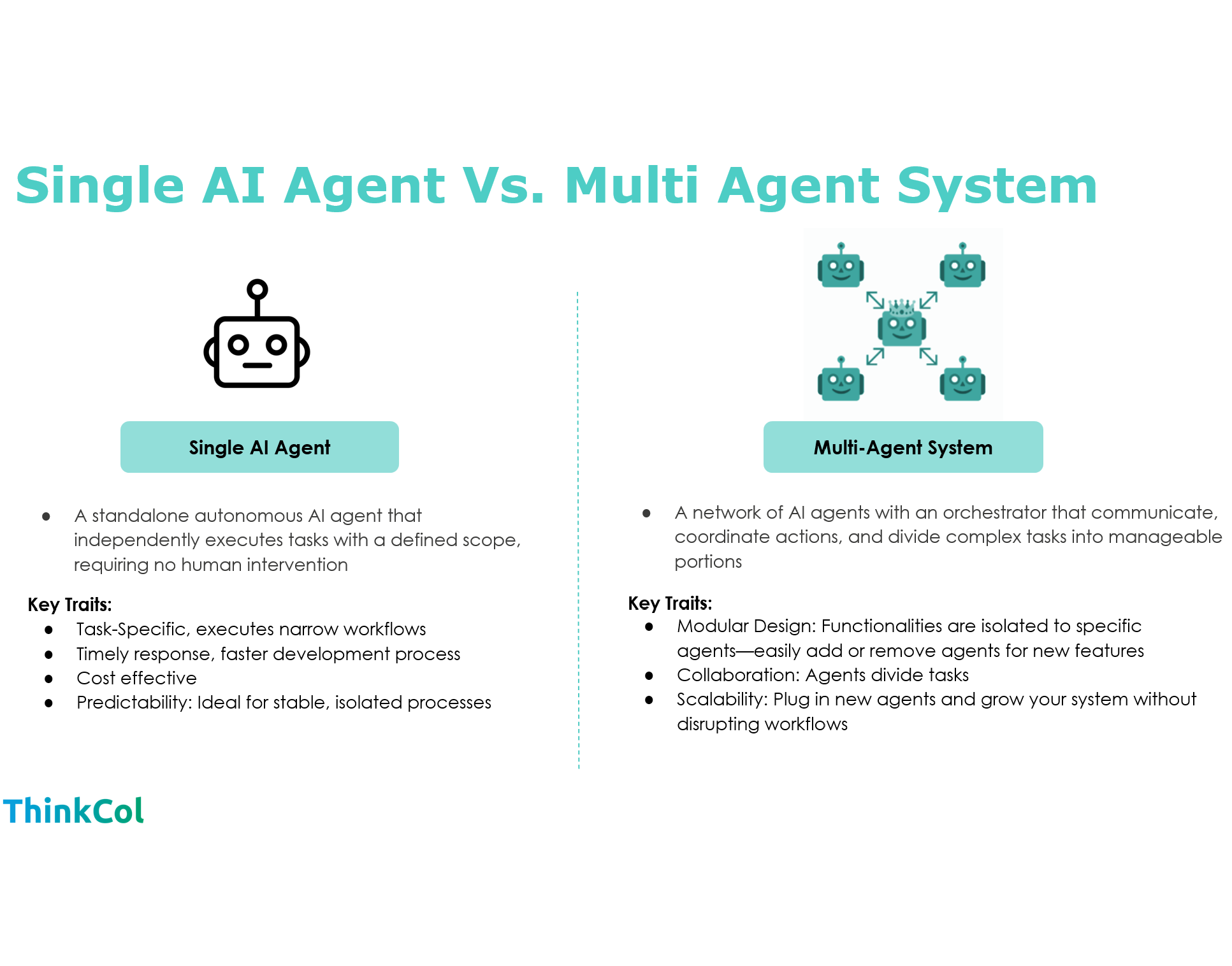
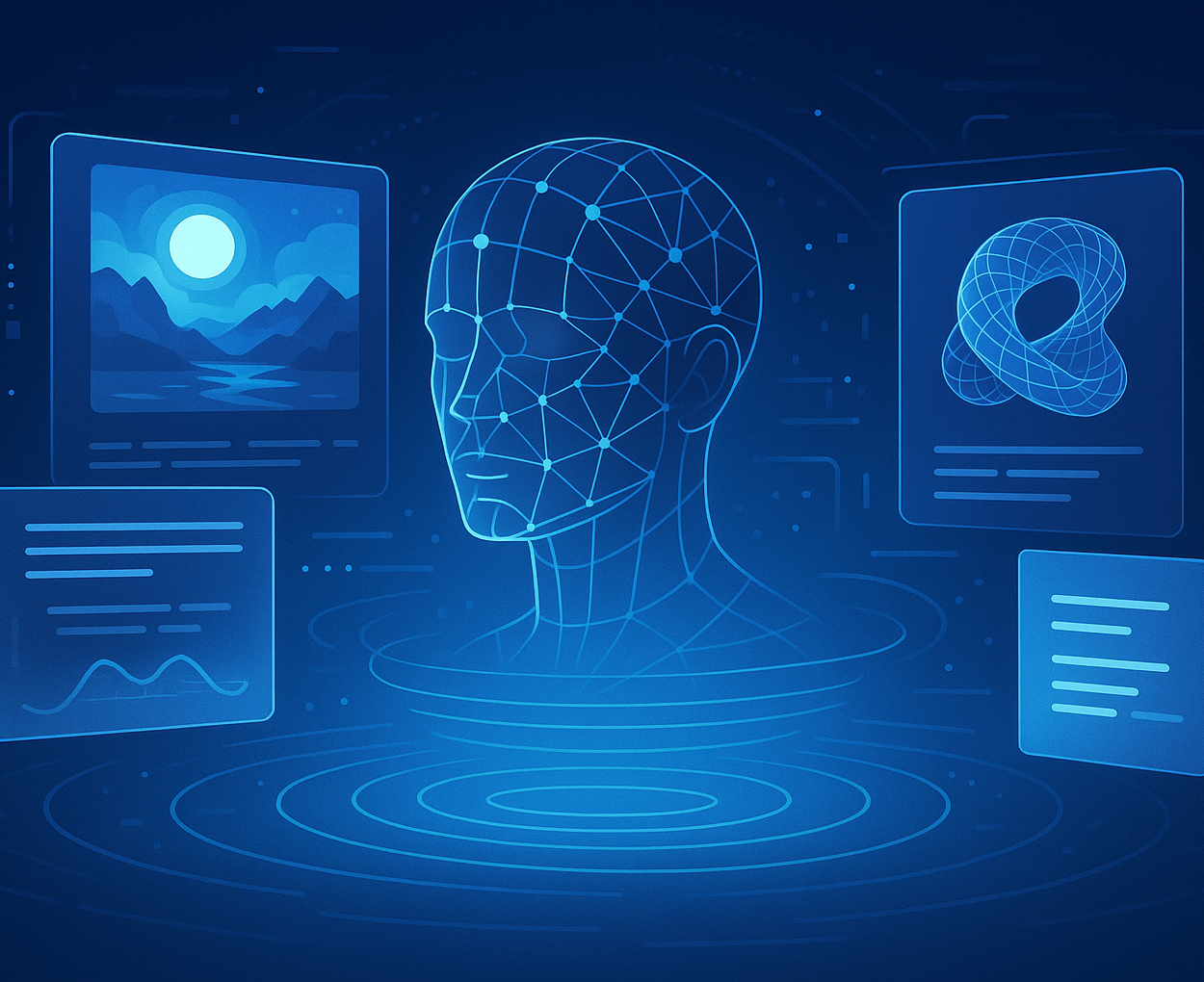
Understanding the AI Landscape: Generative AI, AI Agents and Agentic AI
The AI field is filled with numerous terminology that can sometimes overlap or cause confusion. Let's clarify the key differences between three important concepts: generative AI, AI agents, and agentic AI.
Generative AI: The Creative Force
Generative AI refers to artificial intelligence systems designed to create original content based on patterns learned from vast amounts of training data. These systems can produce text, images, video, audio, or software code in response to user prompts. Generative AI waits for a prompt and then generates content based on that input. Examples include ChatGPT, DALL-E, and MidJourney, which have revolutionized content creation across various industries.
AI Agents: The Individual Performers
An AI agent is theoretically a single entity designed to handle multiple tools and tasks with one prompt. It operates autonomously to achieve specific goals with limited supervision. Unlike traditional AI models, which operate within predefined constraints, AI agents exhibit autonomy, goal-driven behavior, and adaptability to changing environments. These agents can make decisions and take actions based on their understanding of tasks and contexts.
Agentic AI: The Collaborative Orchestra
Agentic AI takes the concept of AI agents further by coordinating multiple specialized agents to work together toward a common goal. This approach involves different types of agents – such as SQL agents, analysis agents, and file generation agents – each with their own specialization, working under the coordination of a planning agent that orchestrates their efforts. Agentic AI systems don't just generate outputs; they make decisions, take actions, and adapt to changing environments in pursuit of specific objectives.
The fundamental difference lies in their purpose and autonomy: generative AI creates content, while agentic AI accomplishes tasks through decision-making and autonomous action with minimal human input.
Implementing Agentic AI: Tools and Frameworks
Implementing agentic AI requires specialized frameworks and tools that enable the orchestration of multiple AI agents. Here are some of the most prominent approaches:
AutoGen: Orchestrating Agent Conversations
AutoGen is a powerful framework for orchestrating AI agents, making it easy to build modular AI workflows where each agent handles a specific task. It offers a unified multi-agent conversation framework as a high-level abstraction for using foundation models. AutoGen provides mechanisms for agent communication protocols, conversation patterns, and integration with external resources, allowing developers to create complex, collaborative problem-solving systems.
LangGraph: Structuring Multi-Agent Workflows
LangGraph provides a framework for building multi-agent workflows, allowing developers to structure how different agents connect and interact. It enables creating networks of agents that can collaborate on complex tasks, with different patterns for collaboration including shared scratchpads, agent supervisors, and hierarchical agent teams.
Model Context Protocol (MCP): Bridging Data Sources
MCP is an open standard that allows AI models to access files, APIs, and tools directly without intermediate processes like embeddings or vector searches. An MCP server acts as a bridge between AI models and various data sources, enabling real-time query and retrieval of information. This protocol enables agentic AI systems to access the data they need efficiently, enhancing their ability to make informed decisions and take appropriate actions.


Agentic AI Use Cases: Transforming Industries (Part 1)
Agentic AI is finding applications across various industries, transforming how businesses operate and solve complex problems:
Software Development
AI agents can function as developers, writing, testing, and debugging code autonomously. They can break down complex programming tasks into manageable components, work through technical challenges, and even optimize existing codebases for better performance.
Knowledge Management and Research
As research assistants, agentic AI systems can access multiple data sources, analyze complex information, generate insights, and create comprehensive reports. They can manage information across different databases and formats, making them valuable tools for knowledge-intensive industries.
Business Process Automation
In sectors like insurance, human resources, retail, and e-commerce, agentic AI can automate complex workflows that involve multiple steps and decision points. For instance, in insurance processing, different agents can handle document analysis, risk assessment, policy comparison, and customer communication, all coordinated by a central planning agent.
Agentic AI Use Cases: Transforming Industries (Part 2)
Project Management Automation
Professionals are actively building AI agents to replace traditional project managers, integrating with tools like Jira and Slack. These agents can assign tasks, track progress, facilitate communication between team members, and generate reports—all while adapting to changing project conditions with greater consistency than human managers.
Customer Support Automation
E-commerce businesses are deploying sophisticated support agents that go beyond basic chatbots. These systems can access inventory systems, order histories, and shipping databases to resolve complex customer issues without human intervention, handling tier-1 support while escalating only the most complex cases.
Talent Acquisition and Recruitment
AI agents are revolutionizing hiring by autonomously sourcing candidates, screening applications, ranking potential fits, and even scheduling interviews. This dramatically reduces the administrative burden on HR teams while improving candidate matching accuracy.
Sales Development and Follow-up
Companies are building agents that handle pre-call research, post-call follow-up, and lead routing, ensuring sales teams have comprehensive information about prospects and automating the administrative aspects of the sales process.
Supply Chain Optimization
Agentic AI can transform supply chain management by coordinating different aspects such as inventory management, demand forecasting, logistics planning, and supplier communication. By having specialized agents for each of these functions working together, businesses can achieve more efficient and responsive supply chains.
The "paperwork nightmare" of international shipping is being tamed by AI agents that can monitor regulatory changes across countries, produce updated documentation on the fly, and communicate with all parties involved—from drivers to warehouses to customers—in multiple languages simultaneously.
Summary for Industries
The most successful implementations share a common approach: starting with clear business objectives, integrating with existing tools, and maintaining appropriate human oversight while gradually expanding agent autonomy as performance is validated. While many standalone products offer specific AI capabilities, the true power of agentic AI comes from customized systems that address an organization's unique processes and challenges.

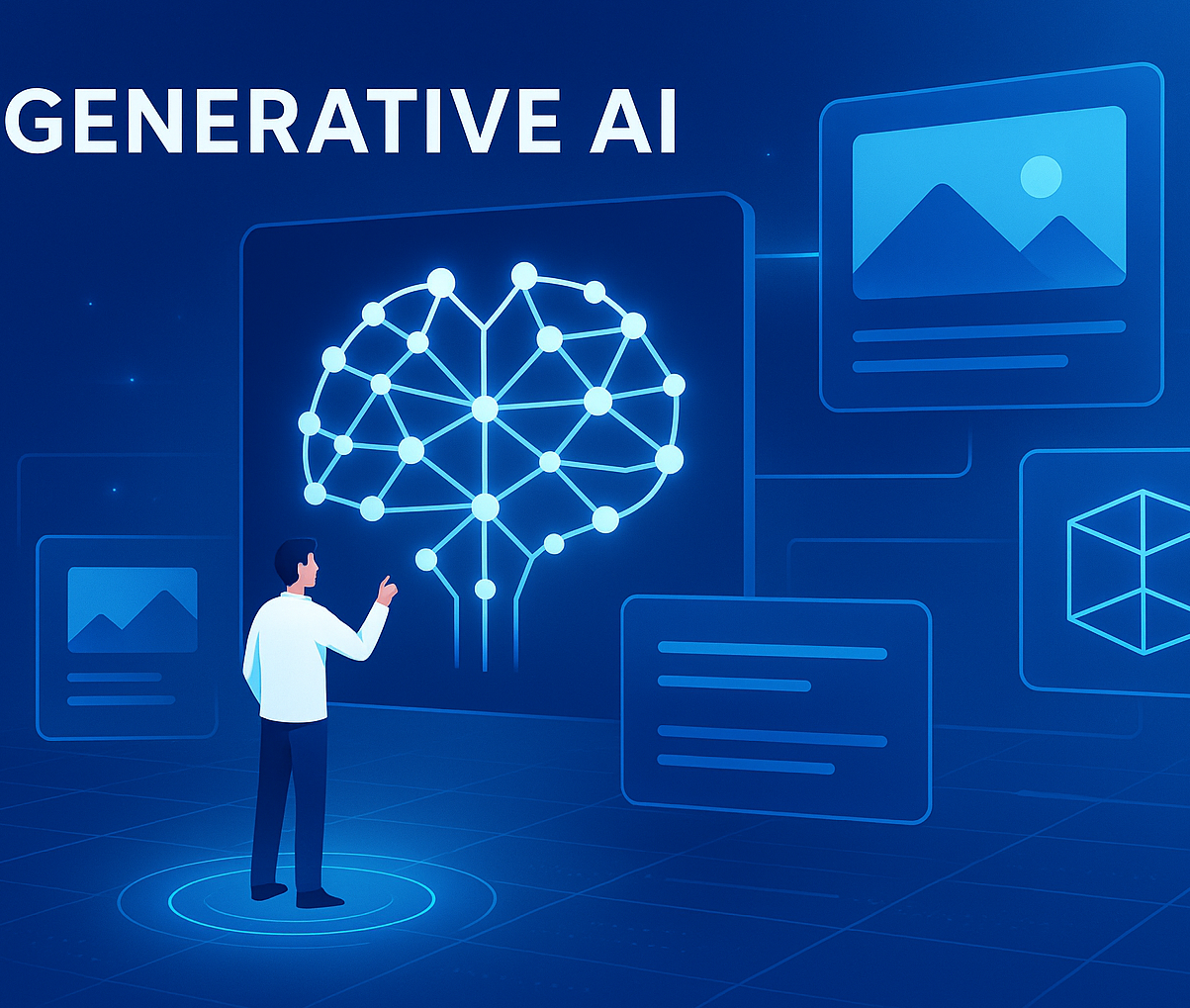
How can ThinkCol Help with Agentic AI
Agentic AI offers remarkable opportunities for automation, efficiency, and business transformation, but it also introduces unique challenges-including model reliability, data quality, system complexity, and the need for specialized talent. ThinkCol, as a leading AI consultancy in Hong Kong, is uniquely positioned to help organizations navigate and overcome these obstacles.
1. Customized, End-to-End AI Solutions
ThinkCol specializes in designing and deploying tailored AI and GenAI solutions that address specific business pain points. By working closely with clients to understand their unique requirements, ThinkCol ensures that agentic AI systems are not just technically sound but also aligned with real-world business goals. This approach helps prevent over-engineering and ensures that AI initiatives deliver tangible value.
2. Enhancing Model Reliability and Predictability
Agentic AI systems can sometimes produce unpredictable results due to their autonomy. ThinkCol addresses this by implementing robust validation, monitoring, and feedback mechanisms within its solutions. Features such as performance monitoring, alerting for irregularities, and continuous validation ensure that agentic AI outputs remain accurate, relevant, and aligned with organizational objectives. This reduces operational risks and builds trust in automated decision-making.
3. Ensuring High-Quality, Real-Time Data
For agentic AI to perform optimally, it needs access to accurate and timely data. ThinkCol's expertise in ETL, cleansing, and integration ensures that AI agents draw from high-quality data pipelines. The company's platforms support advanced data processing and retrieval methods, enabling agentic systems to make informed decisions based on the latest and most relevant information.
4. Streamlining Deployment and Maintenance
Agentic AI can be complex to deploy and maintain. ThinkCol's processes is designed to facilitate automatic deployment, version control, and chatbot orchestration, making it easier for enterprises to move from proof-of-concept to production at scale. This reduces the technical burden on in-house teams and accelerates time-to-value.
5. Building AI Capability and Talent
Recognizing that successful agentic AI adoption requires skilled talent, ThinkCol provides data science training, workshops, and hackathons to upskill client teams and foster a culture of innovation. This helps organizations build the internal expertise needed to manage and evolve their AI systems over time.
6. Robust Governance and Security
With increasing concerns around data privacy and system governance, ThinkCol incorporates best practices in AI governance, ensuring that agentic AI deployments comply with regulatory standards and organizational policies. This minimizes risks related to data security and uncontrolled automation.
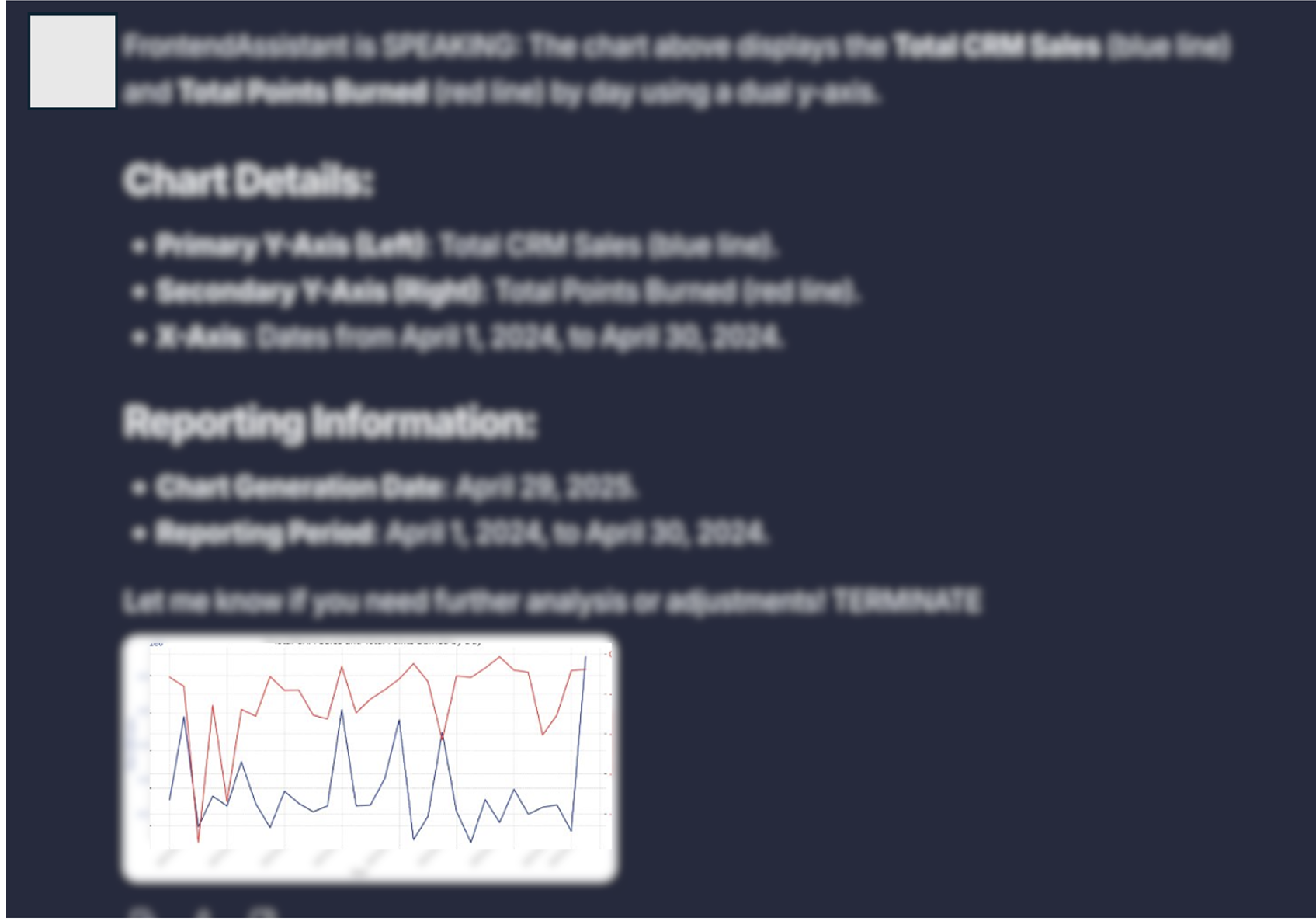
ThinkCol Agentic AI Case Studies
At ThinkCol, we've successfully implemented agentic AI solutions across various industries in Hong Kong. Here are some of our notable case studies:
Case Study: Luxury Jewelry Retail Transformation
Client Situation
In the current jewelry retail environment, sales staff rely on manual processes to understand and serve customers. When a customer enters the store, sales personnel must manually input customer data into the CRM, search through previous purchase history, and make product recommendations based on limited information. This leads to inconsistent customer service, missed sales opportunities, and inefficient use of staff time. Sales teams also lack real-time guidance on selling techniques specific to each customer profile.
ThinkCol Solution
We implemented an Agentic AI-powered Sales Assistant with three key components:
Intelligent Customer Profiling
- Advanced chatbot interface to collect and process customer information
- Seamless integration with existing CRM systems
- Real-time customer profile analysis and pattern recognition
Smart Recommendation Engine
- AI-driven product suggestions based on customer data
- Personalized jewelry recommendations accounting for style, budget, and occasions
- Integration with current inventory and trending items
AI Sales Coach
- Real-time guidance for sales staff during customer interactions
- Dynamic selling scripts tailored to customer profiles
- Instant access to product knowledge and objection handling strategies
Case Study: Healthcare Consultation Optimization
Client Situation
Currently, when patients seek medical consultation, they often face long waiting times and may visit inappropriate specialists due to unclear symptoms. Medical professionals spend significant time conducting initial consultations, gathering basic patient information, and making preliminary assessments. This process is time-consuming, reduces the efficiency of healthcare delivery, and can lead to delayed treatment due to misdirected specialist referrals.
ThinkCol Solution
We implemented an Agentic AI-powered Medical Consultation Assistant with three key components:
Intelligent Patient Profiling
- Advanced chatbot interface for initial symptom assessment and patient history collection
- Seamless integration with existing Electronic Health Record (EHR) systems
- Real-time patient profile analysis and medical history pattern recognition
Smart Triage and Referral System
- AI-driven specialist recommendations based on symptoms and medical history
- Priority-based appointment scheduling considering urgency and specialist availability
- Integration with hospital/clinic scheduling systems and specialist directories
AI Medical Assistant
- Real-time support for medical staff during patient consultations
- Dynamic medical history summaries and relevant test recommendations
- Instant access to medical guidelines and treatment protocols
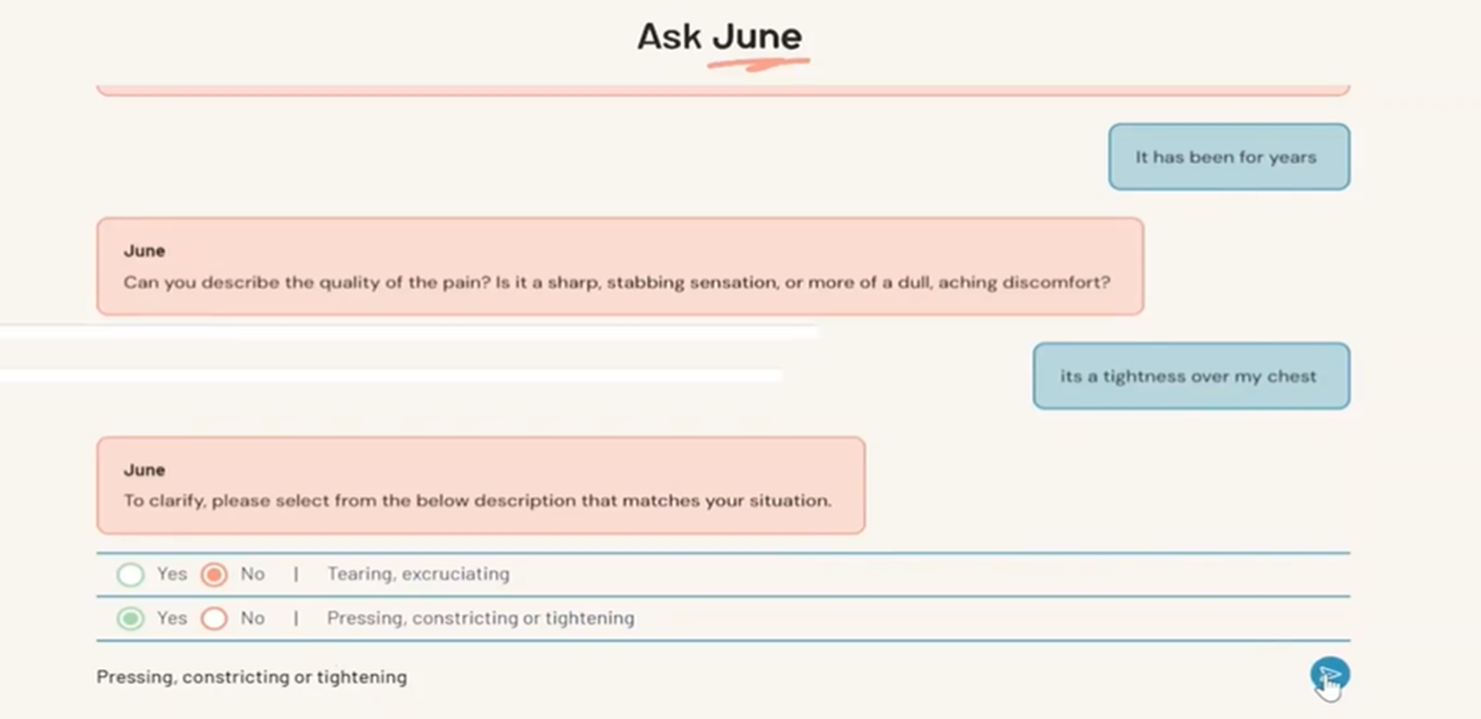
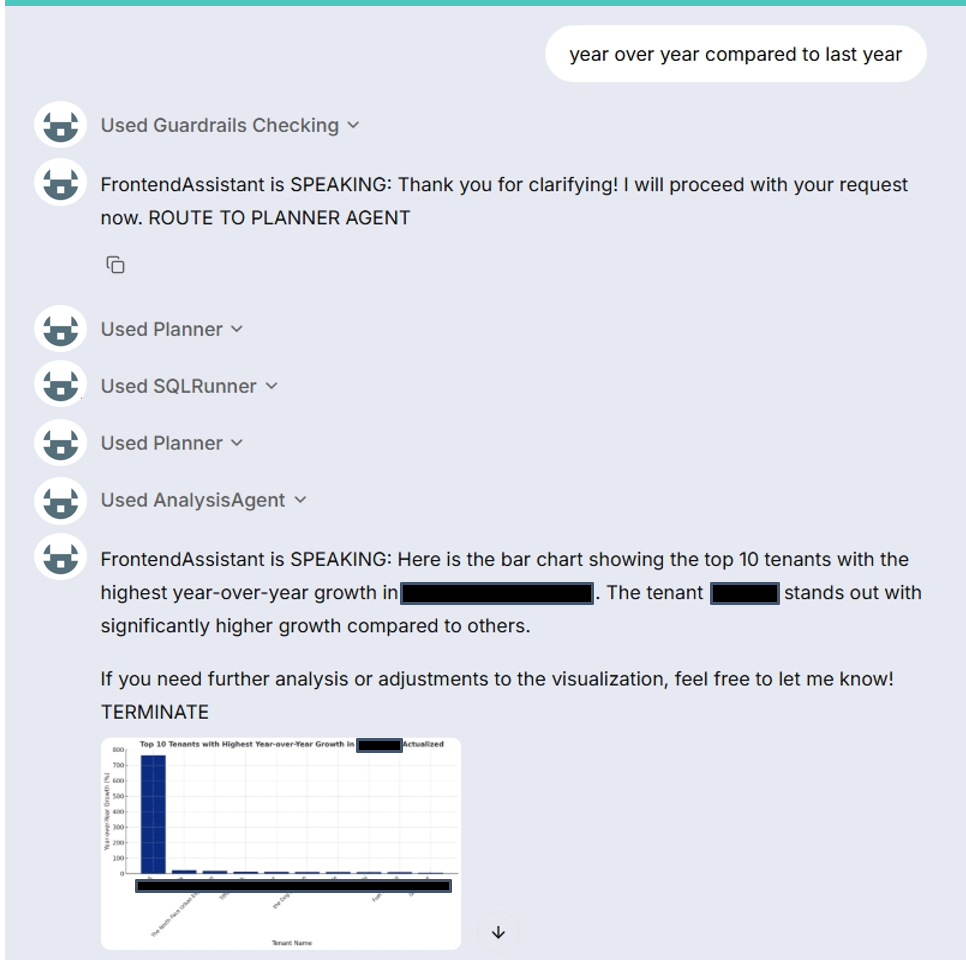
Case Study: Marketing Data Analysis Automation
Client Situation
Marketing teams face challenges in efficiently analyzing complex datasets and generating actionable insights. Manual processes for SQL query generation, data visualization, and report creation are time-consuming, while non-technical users struggle with data exploration. Delays in accessing insights hinder real-time decision-making, and maintaining data governance across user roles adds complexity.
ThinkCol Solution
We deployed a Multi-Agentic AI Framework to automate and streamline data analysis workflows with four key components:
Task Orchestration
- Coordinated agents handle SQL generation, data analysis, visualization, and report generation
- Complex queries broken down into sequential steps for efficient processing
- Automated workflow management and task prioritization
Natural Language Interface
- Intuitive translation of user prompts into SQL queries and Python code
- Conversational interaction with datasets for non-technical users
- Smart query optimization and error handling
Governance & Guardrails
- Role-based data access control and permission management
- Comprehensive audit logging and compliance tracking
- Enforcement of company KPI definitions and data retention policies
Context-Aware Analysis
- Intelligent retention of conversation history and user context
- Dynamic response adjustment based on user roles and historical interactions
- Personalized insight generation and recommendation engine
Case Study: Media Archive Intelligence System
Client Situation
A leading public broadcaster faced significant challenges in managing its vast media archive. Reporters struggled to locate relevant news clips and content due to the sheer volume of unindexed audio and video files. The absence of efficient search capabilities led to wasted time, missed opportunities, and difficulty in retrieving historical media assets for news reporting and research.
ThinkCol Solution
We developed an AI-powered media analysis portal with two key components:
Intelligent Media Processing Pipeline
- End-to-end processing and indexing of archived media content
- Advanced speech-to-text transcription for audio and video files
- Multi-modal analysis including:
- Keyword extraction and topic modeling
- Object detection and scene classification
- Face recognition and speaker identification
- Contextual scene tagging and metadata generation
Smart Search and Retrieval System
- Natural language query processing and decomposition
- Multi-dimensional search capabilities across:
- Transcribed speech content
- Visual elements and scenes
- Metadata and contextual information
- Temporal and chronological data
- Precision-focused retrieval algorithms for exact content matching
- Context-aware result ranking and relevance scoring
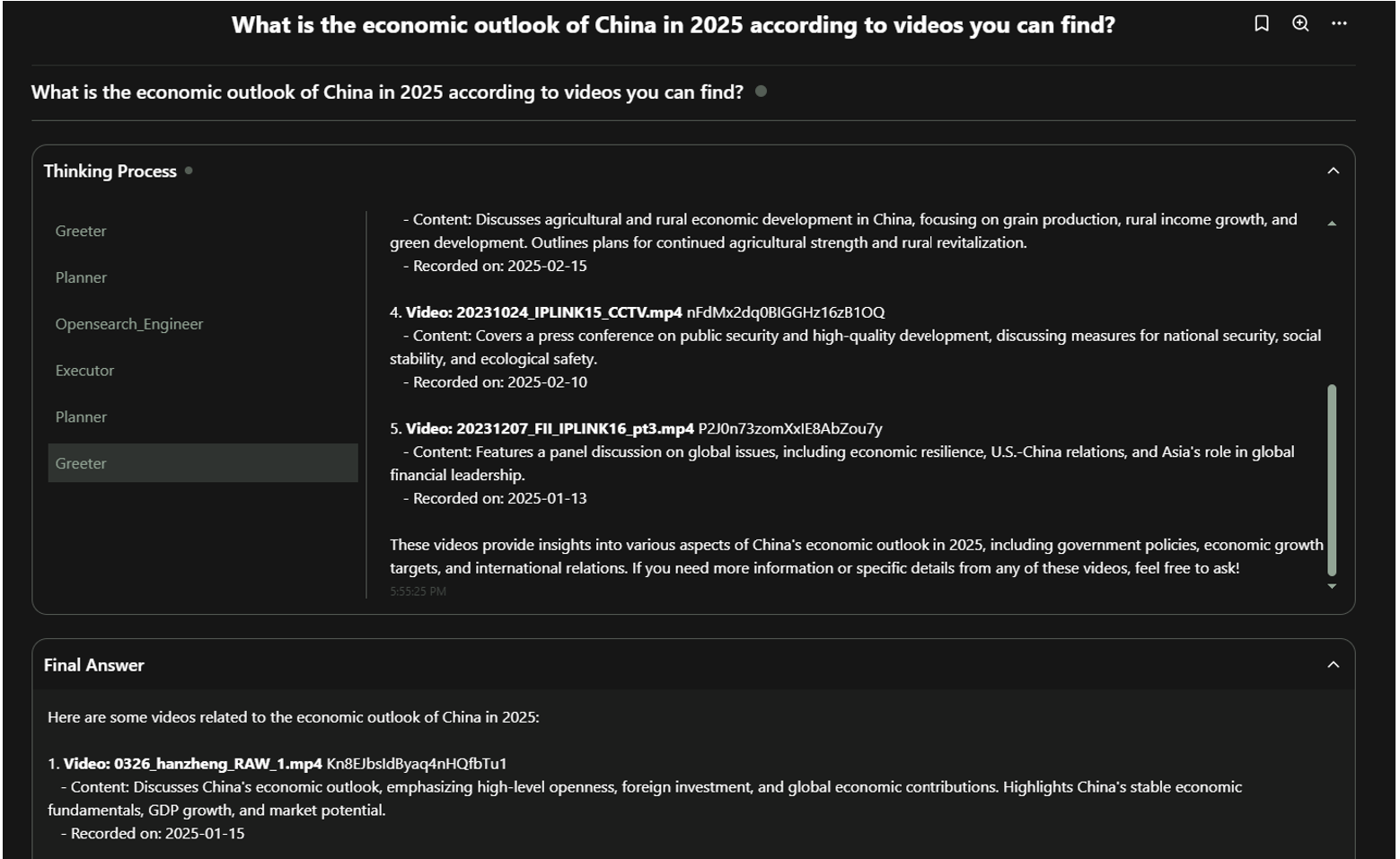
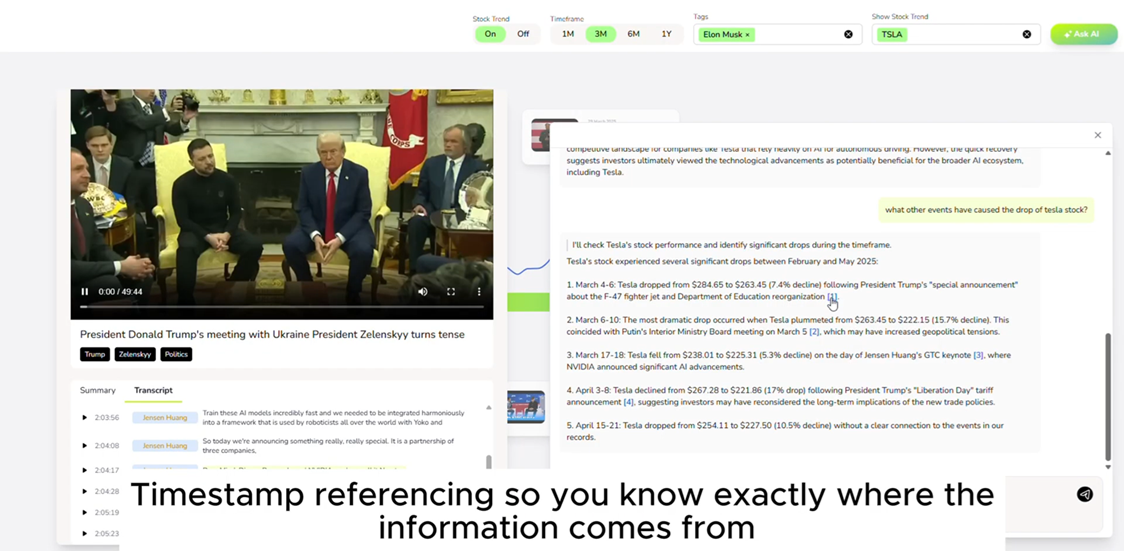
Case Study: Real-Time Market Impact Analysis
Client Situation
Market analysis team struggled to efficiently monitor how public statements from high-profile figures like Elon Musk, Donald Trump, and Vladimir Putin influenced financial markets. Analysts spent hours manually reviewing video content, transcribing speeches, and correlating statements with stock price movements. International content required additional translation resources, creating bottlenecks. The team lacked real-time analytics capabilities, often discovering market-moving statements hours after they occurred, missing valuable trading opportunities and insights for clients.
ThinkCol Solution
We deployed an Agentic AI Analytics Platform that transforms video content into actionable financial insights with four key components:
Automated Video Processing
- Continuous monitoring and analysis of video content featuring key public figures
- Real-time extraction of relevant statements and sentiment analysis
- Automated content categorization and priority scoring
Multilingual Transcription & Analysis
- Automatic transcription and translation of content in multiple languages
- Elimination of language barriers to global market intelligence
- Cultural context awareness for accurate interpretation
Financial Data Integration
- Direct connection to stock and ETF price feeds
- Real-time correlation between statements and market movements
- Historical pattern analysis and trend identification
Financial Analysis Engine
- AI-powered evaluation of transcripts against financial data
- Prediction of potential market impact and volatility
- Automated generation of actionable insights and alerts
Conclusion
Agentic AI represents a significant evolution in artificial intelligence, moving beyond content generation to autonomous decision-making and action. By coordinating multiple specialized agents, agentic AI systems can tackle complex tasks that would be challenging for individual AI models. At ThinkCol, we're leveraging frameworks like AutoGen, LangGraph, and MCP to implement cutting-edge agentic AI solutions for businesses in Hong Kong.
While the potential of agentic AI is immense, it's important to approach its implementation with a clear understanding of its limitations and challenges. Not every problem requires a complex multi-agent system, and the maintenance, reliability, and governance challenges associated with agentic AI need careful consideration.
As AI continues to evolve, ThinkCol remains committed to helping businesses navigate this complex landscape, implementing solutions that drive real value while managing the associated risks and challenges. By staying at the forefront of AI innovation, we're helping Hong Kong businesses prepare for a future where intelligent, autonomous systems play an increasingly important role in business success.
